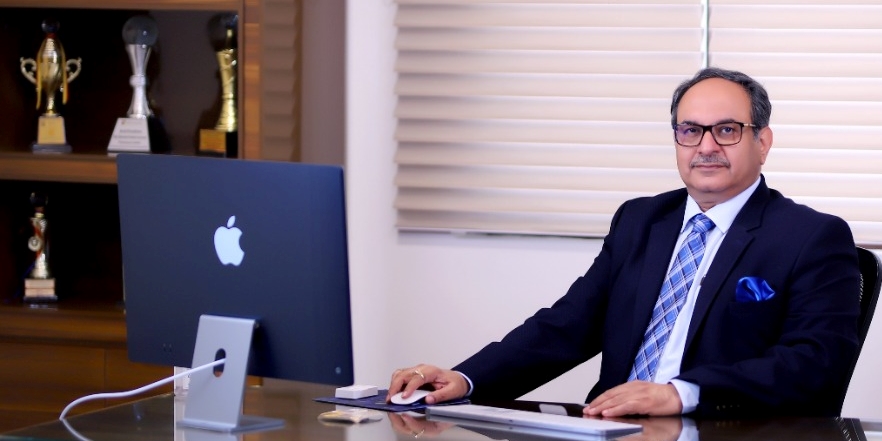
The first Bal Bharati Public School was started by the Child Education Society in 1944 in a makeshift accommodation. From a tender sapling it has grown to a sturdy oak. Altogether, the Society has today 21 schools and two teacher training centres spread across the NCR and several States with a total enrolment of some 30,000 students. All the fully fledged schools run by the Society in the NCR count among the best. The motto of the Society and all its institutions is to strive for better and better, not resting on one's oars; seek solutions, not excuses and deliver results; and serve the community by providing quality education.
The purpose of education is to ignite a spirit of inquiry, creativity, a thirst for knowledge, striving for excellence, character-building, self-development as well as cultivate good habits to last a life-time. Above all, when the time comes, to stand on one's own feet and not become a drag and a burden on society.
I am proud to say that Bal Bharati Public School, Dwarka strives tirelessly to mentor its students to realize their potential and develop confidence to face the future challenges in a fiercely competitive world moving at a scorching pace.
I am proud to say that Bal Bharati Public School, Dwarka strives tirelessly to mentor its students to realize their potential and develop confidence to face the future challenges in a fiercely competitive world moving at a scorching pace.
Language and the Path of Progress
Knowledge is power; language, no less.
Knowledge is power; language, no less.
Great religions Hinduism, Islam and Christianity-owe not a little of their appeal and intensity of devotion among the faithful to the power, beauty and music of the language of their sacred texts in Sanskrit, Arabic, Latin, English and other European languages. So much so that the Koran may not be recited in any language other than Arabic.
Jawaharlal Nehru's Independence Day oration Tryst with Destiny and the British Prime Minister Winston Churchill's wartime speeches inspired and moved millions. Communication skill is the hallmark of a person of education, culture and influence. Also, a key to success in today's globalised world with instant communication. Information technology and knowledge-based industries are now the drivers of economic growth, employment and wealth generation. It is estimated that, presently, two billion people can speak English. It is becoming everybody's second language when it is not the first.
In India, I am afraid, English is there to stay and dominate the world of business and finance, science and technology, scholarship and the higher echelons of administration and the professions. Some 70 million Indians can speak English; 25 million may be regular users, not necessarily of regular English! As English is not native to India and language mirrors the soul and spirit of a people, most of us can at best hope to be efficient, not creative practitioners. Literary forms, basic education, mass communication and popular entertainment will continue to find expression in Indian languages.
Historically, languages have flourished and then declined or simply withered away because they could not keep up with the times. Latin was the language of learning and religious and scientific discourse throughout Europe— till the 17th century. It was replaced only when European languages caught up. French was once the court language in England (12th to 15th century). The Foundation Statutes of some colleges at Oxford forbade students to speak English on pain of fine in the 14th century. Isaac Newton composed his seminal Principia Mathematica (1685-86) in Latin. English Courts delivered judgments in Latin till the 18th century. How times change. English is today the preeminent international language and a powerhouse of knowledge in every domain.
Unfortunately, two centuries of British rule arrested the growth of Indian languages. These have rich literature but they have fallen far behind in new learning and technologies. By contrast, even when China was under foreign rule for centuries, the Chinese language was not supplanted. Since the Meiji Restoration in 1867, Japan has kept pace with the phenomenal advancement in science and technology. For a 100 years or so some 5,000 to 7,500 works in major European languages have been translated into Japanese each year.
Far from original scholarly works in science, technology, engineering, medicine, finance, etc. hardly any translations are available in Indian languages. The gap is widening, not narrowing. We seem to have missed the bus. English is now the only language which keeps open for us the doors and windows to progress in the modern age which is driven by knowledge-based industries, innovative products and services.
Our aim should be to make our people truly bilingual, fluent in their mother tongue and in English. We at Bal Bharati encourage children to speak chaste and not hybrid or khichhri Hindi and English. Hopefully, a day will come when we will not be so dependent on English, but this will require Herculean efforts on our part. Making up for three centuries of neglect is not going to be easy.
Mr. Nikhil Channa
Chairman
Chairman

